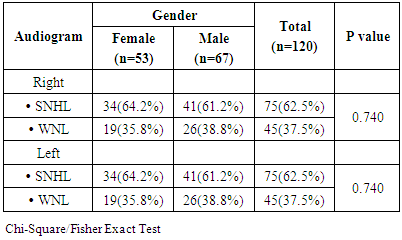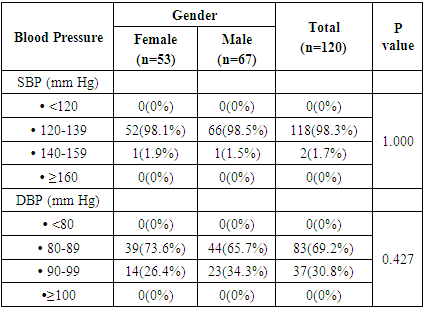-
Paper Information
- Paper Submission
-
Journal Information
- About This Journal
- Editorial Board
- Current Issue
- Archive
- Author Guidelines
- Contact Us
Research in Otolaryngology
p-ISSN: 2326-1307 e-ISSN: 2326-1323
2019; 8(2): 20-24
doi:10.5923/j.otolaryn.20190802.02

Hearing Impairement in Essential Hypertensive Patients: A Prospective Study at a Tertiary Care Center
Praveena Vemanna, Kartik Irappa Patil, Rukmini M. Prabhu, Bhanuprakash Putane Nanjunda Rao, Borlingegowda Viswanatha
Department of Otorhinolaryngology, Bangalore Medical College and Research Institute, Bangalore, Karnataka, India
Correspondence to: Borlingegowda Viswanatha, Department of Otorhinolaryngology, Bangalore Medical College and Research Institute, Bangalore, Karnataka, India.
| Email: |  |
Copyright © 2019 The Author(s). Published by Scientific & Academic Publishing.
This work is licensed under the Creative Commons Attribution International License (CC BY).
http://creativecommons.org/licenses/by/4.0/

According to World health organization (WHO), a person who has hearing thresholds of 25db or more in both ears is said to have hearing impairement [1]. Hearing loss affects the quality of life of the people when acquired in adulthood. The estimated prevalence of adult onset deafness in India is about 7.6%. [2] Systemic arterial hypertension is an independent risk factor for the hearing loss. To minimize the degenerative mechanisms of the auditory system resulting from circulatory effects of hypertension, there is a need to incorporate audiological referral as a routine for every essential hypertensive patients. Hence physicians need to be aware of the co-existence of the hearing loss with essential hypertension. Objectives: To assess the type, degree, proportion of hearing impairment among all essential hypertensive patients and to correlate the duration of essential hypertension and degree of hearing loss. Methods: This descriptive cross sectional study was done at a teaching hospital, during study period from November 2017 to May 2018. A total number of 120 essential hypertensive patients enrolled for study were subjected to otolaryngological examination, blood pressure recording, Oto endoscopy and pure tone audiogram (PTA) evaluation. Hearing impairment were assessed and correlated statistically. Results: In the present study the patients were in the age group 18 to 60 years. In 120 essential hypertensive 55.8% were male and 44.2% were female. In both genders tinnitus was the presenting symptom (88%) of the patients followed by hearing loss (62%), vertigo (6%) and epistaxis (21%). In the present study, based on clinical and audiometric evaluation, all essential hypertensive patients having hearing loss were found to have sensorineural hearing loss. On PTA evaluation, in the right ear 39% of patients had normal hearing, 43% had mild sensorineural hearing loss (SNHL), 31% had moderately severe SNHL and 3% had severe SNHL. In the left ear 38% had normal hearing, 39% had mild SNHL, 31% had moderate SNHL, 9% had moderately severe SNHL and 3% had severe SNHL. As per the hearing loss there was predominance of mild and moderate degree hearing loss. In our study 29% patients were hypertensive for less than a year. 75% patients were hypertensive for three years and 16% patients were hypertensive for more than three years, and the correlation of duration of the disease with the hearing loss was not statistically significant (p=0.996). Among 120 essential hypertensive patients, 99% were taking antihypertensive medications (Fischer exact test and the p=1.000). Conclusion: This study showed a significant correlation between systolic blood pressure and PTA results for both the ears (p<0.001). Study also showed significant correlation between diastolic blood pressure and PTA results (p-<0.001).
Keywords: Hearing impairment, Essential hypertension, Hearing loss, Pure tone audiometry
Cite this paper: Praveena Vemanna, Kartik Irappa Patil, Rukmini M. Prabhu, Bhanuprakash Putane Nanjunda Rao, Borlingegowda Viswanatha, Hearing Impairement in Essential Hypertensive Patients: A Prospective Study at a Tertiary Care Center, Research in Otolaryngology, Vol. 8 No. 2, 2019, pp. 20-24. doi: 10.5923/j.otolaryn.20190802.02.
Article Outline
1. Introduction
- The hearing sensitivity loss is the most common form of hearing disorder. It is characterized by a reduction in the sensitivity of auditory mechanism so that sounds need to be presented at higher intensity than normal.According to World health organization (WHO), a person who has hearing thresholds of 25db or more in both ears is said to have hearing impairment. The World health organization has estimated that 278 million people suffer from a moderate to profound hearing loss [1]. Hearing loss affects the quality of life of the people when acquired in adulthood. The estimated prevalence of adult onset deafness in India is about 7.6% [2]. Hearing sensitivity loss is caused by abnormal reduction of sound being delivered to the brain by a disordered ear [3].The hearing system affection may cause psychosocial effect, amongst which low self esteem, isolation, depression and irritability and these problems interfere with quality of life [4]. Clinically significant sensorineural hearing loss was found to be of mild and moderate degree in pre hypertensive patients and moderately severe and severe degree in stage-I hypertension. Essential hypertension is a form of hypertension that has no identifiable cause. It is a common form of hypertension affecting 95% hypertensive population. In people with hypertension early presbyacusis can set in at an early decade which can become worse by added factors like noise pollution and vascular pathologies.Hypertension is a common disease in India and our set of population does not undergo master health check up. Studies exist on hearing loss and hypertension but there is minimum data regarding hypertension as a risk factor of hearing loss. The present study emphasizes periodic early screening for hearing loss in essential hypertensive patients can improve their quality of life.
2. Objectives
- a) To assess the type, degree and proportion of hearing impairment among all essential hypertensive patients.b) To correlate the duration of hypertension and degree of hearing impairment.
3. Methodology
- This descriptive cross-sectional study of 120 essential hypertensive patients attending to otorhinolaryngological department with various ailments were screened for hearing impairment whose symptoms went unnoticed at a teaching hospital, during period November 2017 to September 2018 were enrolled for the study after the eethical committee clearance.Inclusion criteria: Essential hypertensiveŸ Patients in the age group of 18 to 60 years of both sexes.Ÿ The above criteria include essential hypertensives on medications as well as newly diagnosed patients.Ÿ Patients on only hypertensive medication.Exclusion criteria:Ÿ Family history of deafnessŸ Aural discharge and deafnessŸ Congenital deafnessŸ Noise induced hearing lossŸ Previous otological surgeryŸ Pregnant and lactating mothersŸ ObesityŸ Alcoholics and smokersŸ Patients with renal disordersŸ Patients taking drugs for other associated illness with possible ototoxic effectAll patients willing for taking part in the study were explained in detail about the procedure, and informed consent was obtained for the same. Essential hypertensive patients who attend otolaryngology clinic were selected. Detailed history is taken with emphasis on the hypertensive medications being taken (class of drugs, dosage, and duration of treatment). Detailed ear, nose and throat examination which includes otoscopic examination and tuning fork tests to rule out external and middle ear diseases. Systemic examination (cardiovascular, neurological, renal, hepatobiliary, endocrine, loco motor system) are also carried out for the patients. Routine hematological investigations, liver function tests, renal function tests, mastoid x-rays and ECG were done.After clinical examination was done, patient’s blood pressure was measured in sitting position using a manual sphygmomanometer. After which all patients were subjected to audiological evaluation. Air conduction and bone conduction tests were performed, pure tone average was calculated for three frequencies of 500Hz, 1000Hz, 2000Hz, for both the right and the left ear and plotted in a graph. Similarly the air bone gap was calculated for the frequencies 500Hz, 1000Hz, 2000Hz and plotted in a graph.Statistical analysis:The data has been statistically analyzed by Software SPSS Statistics 24.0 and presented in the form of tables, figures, graphs, diagrams wherever necessary. ANOVA test has been used to correlate degree of hearing loss and duration of hypertension.
4. Results
- There were 120 essential hypertensive patients in our study. Male participants predominated in our study with an average of 56%. The mean age of patients in our study was found to be 49.88 (±9.27) years. Most of the patients were in the 5th decade of life.
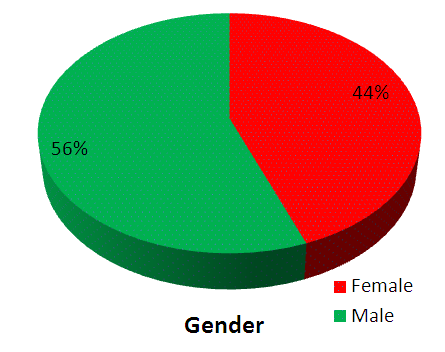 | Figure 1. Showing gender distribution |
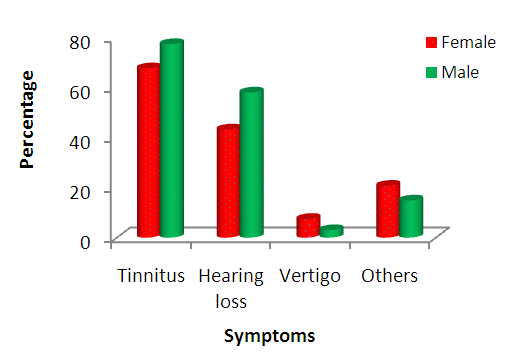 | Figure 2. Showing symptom distribution |
|
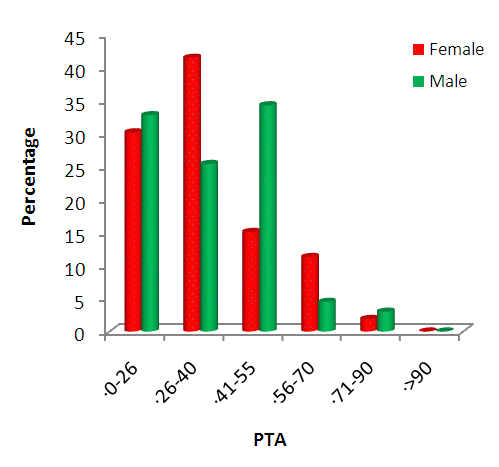 | Figure 3. Showing gender and age distribution |
|
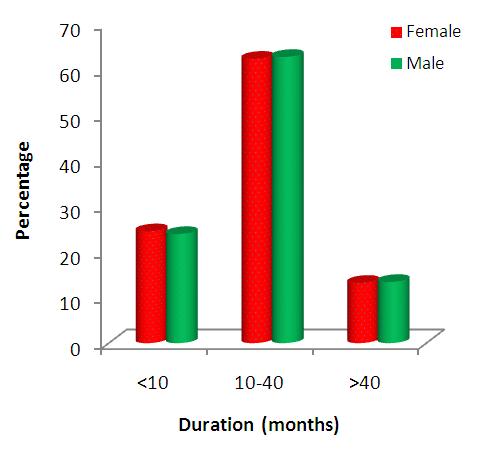 | Figure 4. Showing gender and age distribution |
5. Discussion
- Hearing loss is referred to as the silent, overlooked epidemic of the developing countries because of its invisible nature which prevents detection through routine clinical procedures. In the present study, the association between essential hypertension and hearing loss in the age group between 18 to 60 years were studied. This study showed that hearing loss can occur when they become hypertensive. The increase in duration of hypertension can cause hearing loss. Many environmental factors play vital role especially fatty diet, stress, family history, and raised cholesterol can cause hypertension. Methods have to be identified to prevent hearing loss due to essential hypertension.Hearing is affected in hypertensive in the following manner. The atherosclerotic blood vessels in hypertensive’s cause changes in the Blood hemodynamics [5,6]. The rapidity of blood flow in the cochlea may affect the cochlear dynamics and produce hearing loss at high frequencies at basal turn and apical turn at low frequencies [5,6]. Sodium and potassium perfusion variation can also affect hearing loss [7]. In hypertensive patients due to rapid flow of blood there is no proper exchange of oxygen and nutrients, so they depend on the integrity of the heart and blood vessels. The circulatory system pathology can also affect the hearing directly by Increase in blood viscosity [5]. Reduced capillary blood flow which results in reduced oxygen supply resulting in hypoxia which results in hearing loss [5,6]. Apart from this the arterial hypertension can cause ionic changes in cell potentials and causes hearing loss [6]. Essential hypertension affects vast majority of hypertensive patients. Liu in 1988 assessed audiometric function of 32 individuals with hypertension and coronary heart disease and compared with normotensives.Katz [8] says that all living cells in the human body depend on a proper supply of oxygen and nutrients in order to maintain their function, such supply are dependent on the structural integrity of the heart and blood vessels [8]. Hypertension is the most common vascular disorder which facilitates structural changes in the heart and blood vessels. High pressure in the vascular system may cause inner ear hemorrhage, which is supplied by the anterior inferior cerebellar artery, it divides in to anterior vestibular artery and cochlear artery and supply inner ear [9]. They cause progressive or sudden hearing loss [8,9]. The circulatory system pathology may directly affect hearing in number of ways. One of the vascular pathophysiological mechanisms described is the Increase in blood viscosity, which reduces capillary blood flow and ends up reducing oxygen transport, causing tissue hypoxia thus causing hearing complaints and hearing loss in patients [9]. Moreover arterial hypertension may cause ionic changes in cell potentials, thus causing hearing loss.Rosen et al, in 1962 carried out a study on hypertensive patients. There found a correlation between high blood pressure and hearing loss in high frequencies [11].Marchiori et al, conducted a study in 2006, involving 154 cases and 154 controls, aged 45 to 64 years found that there is significant association between blood pressure and hearing loss [6].Agarwal et al conducted a study in 2013, with 150 cases and 124 controls. The age ranged between 45 to 64 years. This study showed significant association between hypertension and increase in hearing threshold. The increase in hearing threshold was most marked among those with grade 3 hypertension particularly at higher frequencies [12].Mishra et al did a case control study in 2014, in this study there were 150 cases and 150 controls of both genders and they were in age group of 45 to 65 years. This study showed that hypertensive patients had five times risk of developing hearing loss than a normal person without hypertension [4].Mondolli et al conducted a study in 2009 to verify the relationship between systemic hypertension and hearing loss. In this study there were 392 patients of both genders, aged from 45 to 60 years old. Their study showed an evident association between systemic arterial hypertension and hearing loss [13]. According to yeoh LH hypertension is one of the causes of hearing loss [14].According to Baraldi GS et al, systemic arterial hypertension and hearing loss have important prevalence in the elderly population [15].Nazer et al. in a study carried out with controlled chronic hypertensive patients, without diabetes and intense exposure to intense noise and ototoxic drugs for at least 3 years, observed that of 217 controlled chronic hypertensive patients presented with hearing alterations with varied audiogram profiles, the author stated that individual predisposing factors structural or metabolic may in isolated cases causes hearing loss which doesn’t represent habitual development in chronic hypertensive patients [16].Brohem et al. assessed audio metrically 50 hypertensive patients with ages above 45 years in Brazil, and 62% of those had Sensorineural hearing loss [17]. In case controlled study carried at Kenya with 50 elderly individuals using absolute bone conduction test, Chen et al. observed a relation between hearing loss and arterial hypertension in this population [18].
6. Summary
- A descriptive cross-sectional study of hearing impairment among essential hypertensive’s attending otorhinolaryngology department for various ailments during the period of November 2017 to September 2018 was done.There were 120 essential hypertensive patients of both genders 56% were males and 44.2% were females. The mean age of patients in our study was found to be 49.88 (±9.27) years. Most of the patients were in the 5th decade of life. The occurrence of hearing loss among essential hypertensive patients in our study is 75%. In both genders tinnitus was the presenting symptom in 88% of patients, followed by hearing loss in 62%, vertigo in 6% and epistaxis in 21%. Among 120 essential hypertensive patients, based on audiogram report obtained in our study indicates that 75% of patients had sensorineural hearing loss. Clinically significant sensorineural hearing loss was found to be of mild and moderate degree in pre hypertensive patients and moderately severe and severe degree in stage-I hypertension. There is a significant association of hearing loss in essential hypertensive patients. The degree of hearing sensorineural hearing loss was primarily in the mild category with 43% on the right and 39% on the left ear, 31% moderate hearing loss, moderately severe hearing loss in 4% on the right ear and 9% on the left side, and severe degree hearing loss in 3% of hypertensive patients.
7. Conclusions
- This study showed significant correlation between systolic blood pressure and PTA results for both the ears (p<0.001) and it also showed significant correlation between diastolic blood pressure and PTA results (p-<0.001).This study was an attempt to show importance of early routine screening for hearing loss in essential hypertensive patient.
 Abstract
Abstract Reference
Reference Full-Text PDF
Full-Text PDF Full-text HTML
Full-text HTML